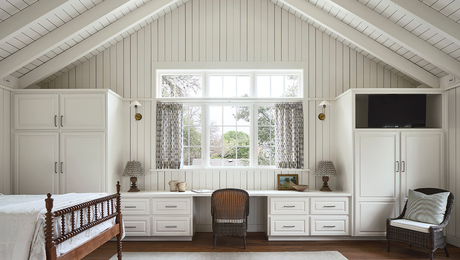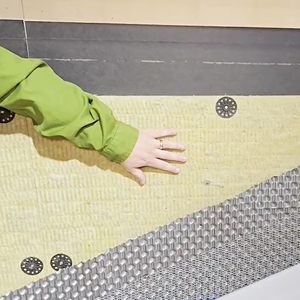Who gets the excess building material?
I have a client I built a large 3 car garage for who feels all of the left over shingles, pine siding and trim boards should be his. The bid was not broken down into framing material, electrical, roofing…just permits, garage inclusive, concrete approach, ect. This was not a cost plus job; I gave a detailed written description of what was included with the project and the price.<!—-><!—-> <!—->
In 15 yrs. and over 250+ projects I’ve never had someone expect me to leave the left over materials. If I did, I would get much closer or even short the initial material order and get what is needed so I end up w/ zero left over material.<!—-> <!—->
Does anyone leave the left over building material at the completion of the job? I’m just trying to understand his point of view.
<!—-> <!—->
Platymapus<!—-><!—->



















Replies
I always leave some extra shingles, roof or sidewall, for inevitable repairs. Besides that, for a fixed price job, you own the materials. If the HO wants the scraps fine, the rest of it, too bad.
For a cost-plus job they own the materials, not for a fixed price--you own the materials.
What could they be thinking?
The materials are yours, you agreed to supply materials to perform a specific task and you completed that task. Some materials left for repairs is a good practice.
It's not a doggy bag.
Long ago I worked on a remodel for an accountant and at the end of a job he presented us will a bill for his increased electricity. He finally took no.
I was on a job for about 7 months..........at the end the owner presented me with a bill for "tool storage".What are they thinking?What a dikkhead.
Rod
I had a client tell me that he should charge me for charging batteries from his electricity. I told him I killed the batteries doing work on his house so shut the hell up. I then told him he should pay for my camera because it broke when he was in the picture.
Have a good day
Cliffy
I think it would be ok for you to pay for that electricity, if he can get an electrical engineer to figure out how much you used. It should only cost him about $300 to get a professional estimate for ten cents' worth of power.
Then you need to insist that he has a license to provide power. And you need to make sure he is paying all of his various fees. I'm sure he wouldn't mind providing documentation.
Next, you need a receipt and you need to pay the sales tax.
Finally, at the end of the year turn in your documentation to the IRS. There must be some 1099 series form that will alert them to the fact that he had some income from you as a sub.
HAHAHA - look who's laughing now!
Did you tell him that you agree not to put a lien on his property if he agress not to try to put a lien on your tools?
Tell him you want to be there when he asks for the paperwork to file his "tool lien".
Now the guy that made the comment about the increased electricity - almost as funny. However, I guess I could see the point if it was something really odd - like perhaps it was a winter job and they kept a non-insulated pole barn at 70 deg 24/7 with electric heaters for a 3 month project. Highly unlikely, but if I were the HO and was not around to see this happening (away for some reason) I'd be a little miffed.
To the OP - if you did not closely figure the mat'ls needed (allowing for reasonable extras so you don't run short) and have lots of leftovers, then I think they are yours.
Truly, however, if he's paid for them and you are being paid fairly, the ethical thing is to leave the materials if he wants them. If you figure that leftover materials are part of your payment, then I respectfully suggest you re-figure your estimating practices
It is no big secret that tradespersons I know - through careful pack-ratting over many years - end up with enough "free" stuff to save them a ton of money on their own projects.
Edited 4/14/2007 10:20 am by jhausch
It's not a doggy bag.
LMAO. Good one.View Image
Assuming the siding was in boxes or bundles and not able to be separated so partials could be bought, charge the difference between the quantity price and the single piece price. If it's a couple of pieces that probably won't be an exact match to any other job because of sunlight, age or water, it's not going to be any benefit to have just a couple. If it's lumber, again, the difference between the 100bf price and the single piece price should get his attention. Anyone who tries to determine exactly what the job will need as far as materials, is either awfully good or awfully anal and will probably lose money anyway. I have yet to see all perfect lumber, siding, shingles, etc and buying extra is always necessary. I would charge him for more than a little of any one material.
"I cut this piece four times and it's still too short."
I'd tell him that he could have the left over materials if I could use any left over space in the garage, anytime.
How much material is involved? And what would you do with it if you kept possession? If any can go back for creidt, I would keep that, but a few boards or whatever I would leave if they asked. Otherwise I would end up storing it for too long, then finally throw it away after tripping over it one time too many.
"Put your creed in your deed." Emerson
"When asked if you can do something, tell'em "Why certainly I can", then get busy and find a way to do it." T. Roosevelt
The left over materials total less than 500.00. I will leave 3-4 pieces of siding, a bundle of shingles and all of the left over paint. I actually ordered extra 1x6x14's that I will run through my molder at sometime in the near future, the rest of the material will go back the supplier.<!----><!----><!---->
What type of work does the client do?
He does website design, logo design and maybe some still work. I think that is wherre he is getting the idea that all material brought to the jobsite is his.
Platymapus
<He does website design, logo design and maybe some still work. I think that is wherre he is getting the idea that all material brought to the jobsite is his.>So he works AND lives in a land of make-believe? I guess that makes for a short commute...
I think name and reputation is more valuable than 500 bones. Let him have them graciously. Why leave him feeling ripped off over a little material? The good gesture will come back ten fold.
Now go edit your contract to cover this in the future.
By any chance did you use any leftovers from a previous project on his project, i.e. 2x4's, nails, felt paper? If so, just tell him he can have all of the current leftovers, but you'll have to take the other stuff back with you.
But seriously, unless you're doing some kind of cost plus project, the materials are yours just like all of the supplies and tools are yours. It's part of your business inventory.
“The richest genius, like the most fertile soil, when uncultivated, shoots up into the rankest weeds..” – Hume
From a homeonwers perspective, the only time I think I should get leftovers is if I supplied the materials myself. For example one job recently, I picked up and paid for the paint. I wanted the leftovers.
Most folks don't want a stack of shinlges siting in the garage for years, anyway. My wife would give me hell everytime she saw them:)
I have a painter who commonly gets asked for that . (He has been thru this a million times he says)
His reply is to pull out his contract.
He reads it aloud: Supply and apply two coats of (whatever ) to x- sq/ft/ of walls, x-sq/ft ceiling. Paint trim ,( etc. etc.)
As he reads thru the list at the end of each item he says out loud:
"Yep , Did that"
"Yep , Did That"
"Yep , Did That"
Then when he is done reading he looks the owner in the eye and says :
"Did I not do what the contract called for? If you point out to me what I missed I will take care of it , otherwise We must be in agreement that I have fulfilled my contract.
(He always however leaves a pint or qt. of touch up paint in each color.)
What possible reason could there be for a painter to want to stock 100's of partial gallons of special mix paints? I take my ceiling paint back, but wall color stays, the HO pays for it but it stays.
LOL... I hear ya. I'll take the painter's phone number, in fact. I've got a bunch of partial gallons in my basement that I'd love to get rid of.View Image
Thanks to everyone for their input.
Platymapus
MSA1 In my Painters case it is hard to say... he is a pack rat of the first order! On the other hand he owns several rentals and I know that when he has worked for me he cuts his paint order very close .
MSA1,
i have a friend who was a very successfull----though small scale, painting and wall papering contractor.
He kept all leftover paint
he usually mixed it all together in 5 gallon tubs--and used it to paint rentals( his parents owned several)
he tells me you can mix together tons of different, god awfull colors-and it always comes out one shade of beige or another.
anyhow-that's why HE wanted the leftovers.
stephen
Turn it around the other way. If you ran short of materials, who would be responsible for the "extra"? Generally, on a T&M job, the leftovers belong to the customer, on a bid job, the contractor owns them.
To the poster who got a bill for the electricity, I've been including a phrase in my contracts where the homeowner (or GC) will provide access to, and the use of, their electric service for the duration of the job.
Ask these jerk offs if they would have paid you more to buy more meaterials if you had run short.
Mike
If it's a bid, they belong to you.
That said, it may be better in this case to be magnanimous and tell him to keep it all. Good PR.
"Doubt is not a pleasant condition, but certainty is absurd."
~ Voltaire
I disagree with those that say you should leave the materials out of good will. To me, that is akin to admitting that you were wrong to try to take them with you.
What I do when things get weird like that is kill them with kindness. I recently got a phone call about a line item on a final invoice. It was only about $135 but the HO took issue with it. I told him something similar to the following: "Look Mr. xxx, I'm an honest guy. I wouldn't have put it on the bill if it were something that was covered in the original scope of work. You asked us to do it. So we did it. And I billed you fairly for our time. That being said, I don't want to end a great job on a sour note, so if you really believe that I'm trying to jerk you around, then just pay me the balance less the amount in question. I really don't want to argue over $135."
Now granted that can back fire. But it hasn't yet. And $150 is about my limit with the "Mr. Nice Guy" act.
Since you took the chance and bid a firm price as an experienced contractor I think you have a right to those materials. After saying that, in order to maintain a positive customer relationship I would offer a few of the materials which may be required as replacements later on (such as open bundles of shingles).
To avoid such events I make certain to remove extra materials from the sight as quikly as possible, before the homeowner has the time to dream up uses for them.
I try to finish the task and if I'm over a bundle or two, I throw in the back of the truck. Get it off the jobsite as soon as done. Doesn't leave the question at the end of a job and it gives the impression of a completed job with little waste or overage.
Sometimes the situation doesn't allow for it, but generally it keeps the job cleaner and looks better for you in the end.
Judo Chop!
Ironic, isn't it? The dispute seems to usually be about who hauls off all the junk. Then again, some customers seem to think it's strange for you to ask to use their bathroom..... Off the cuff, I'd expect some extra floor tiles, roofing shingles, cove base, paint, etc. left behind for future repairs. Such stuff is simply impossible to match - even a month later. Even carpet scraps seem to get used ... as floor mats, "welcome" mats, to line the doghouse, to lay in the garage.
Heck, around here house painters go so far as to prepare "six packs" of quart cans for each house, with a can of each color used. Cans are often even labeled as to the places used. Generic materials, such as nails and lumber, I expect to see brought to the job in bulk, and the 'extra' to be retained by the contractor. Perhaps the issue gets a bit cloudier when you're replacing something. For example, in a kitchen remodel, who gets the old counter and sink? For the most part, I maintain that the old stuff still belongs to the customer ... it's their choice to save it, or trash it. Clearly, any special orders belong to the customer. Same thing for minimum orders. Speaking of contracts .... the contract ought to touch on this issue. It ought to define who is responsible for cleaning up waste, scrap, debris .... and raw materials. If you're counting on the scrap value of something, you better make sure to call that out in the contract.
Related is the issue of site security. Quite often, the materials that 'evaporate' do so after hours, as the customer scavenges for his sundry personal projects. I have found that, at least in my case, the less I have at the site at any one time, the better. Material not needed until 'day 5' ought not be there before 'day 3' .... and any left over ought to be removed by 'day 7' - even if the job runs for weeks.
I know this is a little of topic, but still in line with the general theme.
I bid roofing job for a lady, I don't really do roofs but she was unable to get anyone else to call her back and I have a sub I use who is a roofer, so I took the job. It started off great and quickly went downhill. In a nutshell I measured wrong and built the estimate short on materials. Now my 'estimate' clearly stated the # of squares included in the material list. I did bump it 20% as I usually do the HO took my estimate and purchased the materials herself. When I informed her that my measurements were off she said she didn't feel she should pay for the difference. She said we would work it out and authorized the extra materials to be put on her account and I completed the job. Well, when it came time for payment she deducted the difference in materials from the final payment.
My position was that my estimate was for 'x' materials and she agreed to that price so I shouldn't have to pay for the extra materials that went on her house. I finally relented because I live in a small town and didn't want the bad rap.
Do you all think I did right or should I have held out for full payment?Do everything you do to the very best of your ability, or don't bother doing it at all.
you made a mistake,she gave you the job for x amount of dollars,expecting that to be what it cost. your mistake you eat it and remember it next time. thats called self employment. i think she was right on the roof job. larryhand me the chainsaw, i need to trim the casing just a hair.
Oh yea I did forget to mention that I did have 15 bundles of shingles and 7 sheets of decking left over which I kept and returned to the supplier. I figure that since she deducted the full invoice amount of materials from my labor I own the materials.Do everything you do to the very best of your ability, or don't bother doing it at all.
I did a roof for a guy and at the end of the job there was a full bundle left over. he said I should give him a credit for the cost of that bundle. I told him I should charge him extra because I brought 3 bundles from my previous job to use as starters and that bundle will go to the next job like they always do
I dont roof anymore but I have a trailor loaded with left-overs from previous jobs. I dont usually line item when I grab a left-over and so I expect its my perrogative to pick and choose what I take away at the end of a job
not only that I routinely order extra to keep the process moving forward. It cost money for people to stand around while someone runs to the supplier and its cheaper to return those things when I go there for the next job
I run a business with those things. if I had to restock full boxes of nails, caulk, glue, const adhesive, tape, compound, screws, primer, saw blades, sand paper, rags, 1xstock, thinner, etc. at the start of every job I would out-cost my competition
the guy purchased your services not a construction company
Unless it is a large amount, it might be best to let it go. Lesson learned. Do a written contract on the next job and charge extra for the cost of having a lawyer do the contract.
This is one of those things that puts more weight on the bad side of the scale of life.
I will leave some of the material, a bundle of shingles (really this belongs to the roofer and I'll pay him for the bundle), 3-4 pieces of siding and a couple of 1 x 6's but I won't leave it all because I over ordered the siding and 1 x 6's for MY use. <!----><!----><!---->
In the end I want to be fair to the homeowner and if they don't see it that way then I will never be able to change their minds and I'll be the evil contractor.
Platymapus
platymapus ,
Maybe it's too late on this job but ,,,, you have bid on a completed job , you did not sell materials separately .
We just had a discussion like this over at knots , one tactic you could use when asked about the left over materials is to clearly state that you order more then you actually will use to enable you to sort through and pick and choose the very best materials for their job . Your suppliers allow you to return unused materials for credit , if the home owner would like to pay for the materials he is welcome to keep them. That ought to simmer them down a tad .
It happened to a very respectable GC , well connected with all the right churches and good old boy network , he built a cedar fence for a well respected Dr , of Radiology . The Dr, saw a good sized pile of fence boards left over after the fence was completed , the next day the extra boards were gone , Doc called and asked where HIS boards went .
The Doc is a nice guy , who knows nothing about building or how things are done , he called the GC dishonest and made references to his being dishonest and other such bad mouthing .
I run a cabinet shop and I may buy 400' of hardwood to do a job , I may have 150 ' left over , again I have not spelled out how many feet at how much per foot cost will be used to do the job , that's like selling materials , it's mine .
dusty
Does anyone leave the left over building material at the completion of the job?
Unless it's agreed upon up front, there's no way I'd give away anything that could be returned or used on another job. At first I'd nicely say, "The bid was for enough materials to build your project and leftovers are typically used on the next project or returned." If they just didn't get it I'd then tell them, "No." End of story. They are welcome to call me every name in the book and never refer me to anyone. Good ridance. Next.
Beer was created so carpenters wouldn't rule the world.
Ok! From a client’s perspective, permits pulled , materials delivered and/or a specific job completed does NOT occur without a down payment and balance payment. So logically, the client is under the impression that OBVIOUSLY the final product belongs to the client AND whatever leftover materials resulting from the job. Now if it’s explained (and verified by a receipt) at the VERY beginning of the process( during the estimate phase) that additional materials are routinely purchased by the builder to compensate for any mishaps/miscalculations, then the client may most likely understand and avoid acting like some ridiculous money grabber or control freak! To the client it looks like he/she has financed someone else’s project/job. Without an explanation it’s kind of unsettling in appearance. It just looks like “Hey Waitaminute!!!! Didn’t I pay for the very same stuff that he/she just reloaded on the truck????”